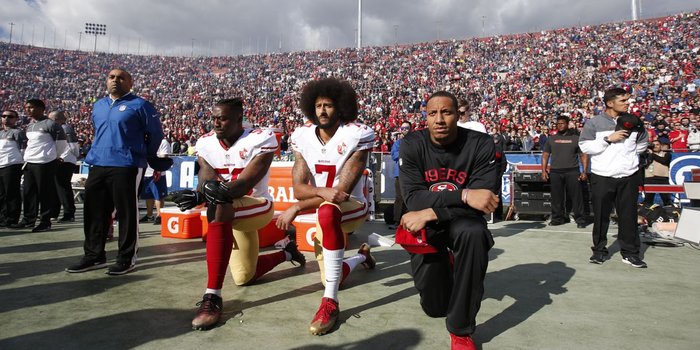To get at some answers, I spoke to experts in marketing, PR, and IP valuation about how the kneeling penalty policy will affect NFL brands from two perspectives: brand health (regard of the public) and brand economics (how reliably these franchises can continue to drive profits). “Unfortunately for the NFL and its players, they’ve lost both on this topic.” When the issue of on-field protests first arose, the NFL was caught flatfooted without a ready response. The announcement referenced respect for the flag and then went straight to rules and punishments with no expression of core beliefs that might resonate even with those who disagree with the policy. By allowing teams to impose their own penalties, the NFL invites a varied patchwork of responses and expression of team values. “The NFL missed an opportunity to deepen connections with its fans by controlling the narrative and building positive momentum,” Rosenblum told me. The continuing controversy will only spell more risk to the health of a brand that has already had to weather a non-stop series of crises of domestic abuse, animal abuse, drug abuse, murder, suicide, DeflateGate, SpyingGate, BountyGate and the ongoing issue of concussions and overall player health and safety. That’s not likely to change any time soon. Advertiser who fear further ratings declines or consumer backlash may spend less on the NFL. In the era of the social media-powered consumer, advertisers have plenty of reason to fear such a backlash. They will need to do a better job of presenting a unified set of league values, moderate their response to the inevitable protest and regain control of overall narrative of their sport.
The NFL’s goal is to make the whole issue go away by taking back control of the story. There is no sign it has succeeded.

The National Football League has announced its new policy to punish players who “take a knee” during the national anthem and fine their teams. The announcement came after the league spent close to two years sitting on the bubble of a brand crisis, which began when Colin Kaepernick first took a knee in October of 2016 to protest police violence in the African-American community. The question now is, what effect this latest move by the NFL will have on its brand? Will the new policy quiet the debate and ease the tension, or throw more fuel on a long-simmering fire?
This dilemma comes with big dollar signs attached: the NFL has been valued at over $25B and the average NFL franchise at $2.5B. The Dallas Cowboys, at $4.8B, is the most valuable sports team in the world.
To get at some answers, I spoke to experts in marketing, PR, and IP valuation about how the kneeling penalty policy will affect NFL brands from two perspectives: brand health (regard of the public) and brand economics (how reliably these franchises can continue to drive profits). A number of them chose to speak anonymously.
Brand health
“The two most powerful forces in marketing are narrative and momentum,” according to Jeff Rosenblum, co-founder of marketing agency Questus. “Unfortunately for the NFL and its players, they’ve lost both on this topic.”
When the issue of on-field protests first arose, the NFL was caught flatfooted without a ready response. President Trump’s high-energy tweets threw the whole issue into a crisis state, still with no response from the NFL. “They were outmaneuvered by Trump,” said one marketing expert. The NFL’s goal is to make the whole issue go away by taking back control of the story. Unfortunately, the new rules seems destined to do the opposite, for several reasons:
- There’s no grounding in values or beliefs. The announcement referenced respect for the flag and then went straight to rules and punishments with no expression of core beliefs that might resonate even with those who disagree with the policy.
- There’s no data. “Why was there no underlying data and analysis to validate their decision-making?” asked Larry Weber, chairman and founder of communications…

COMMENTS